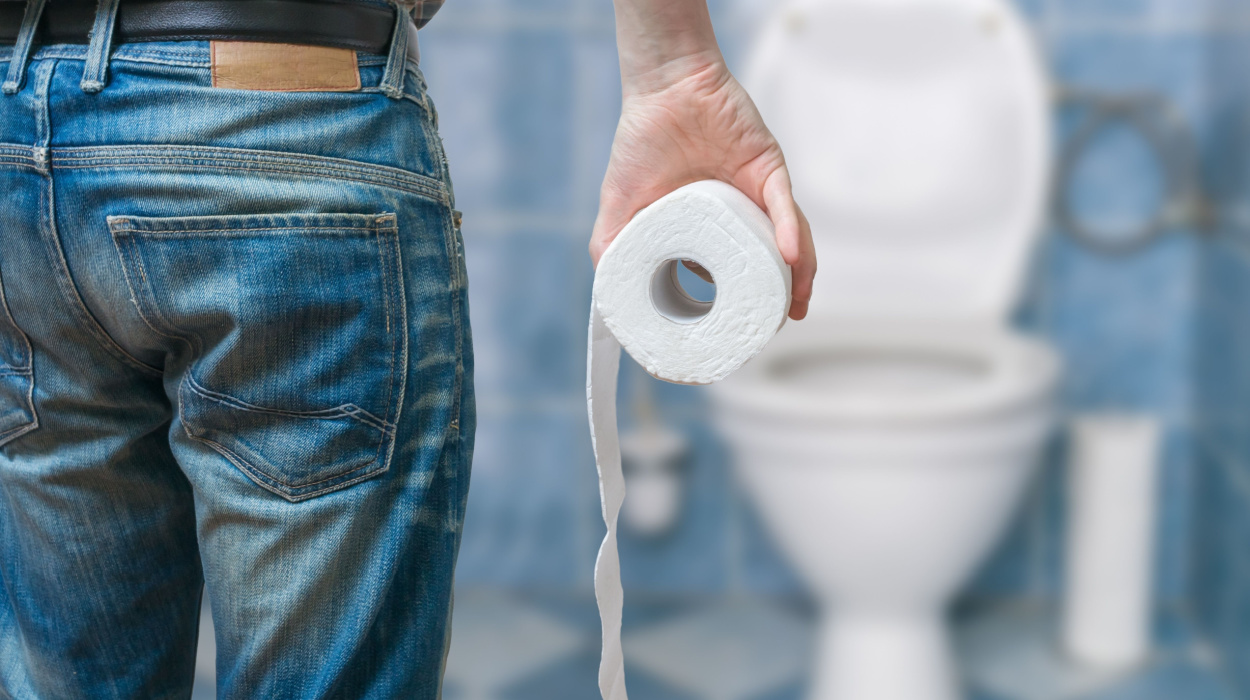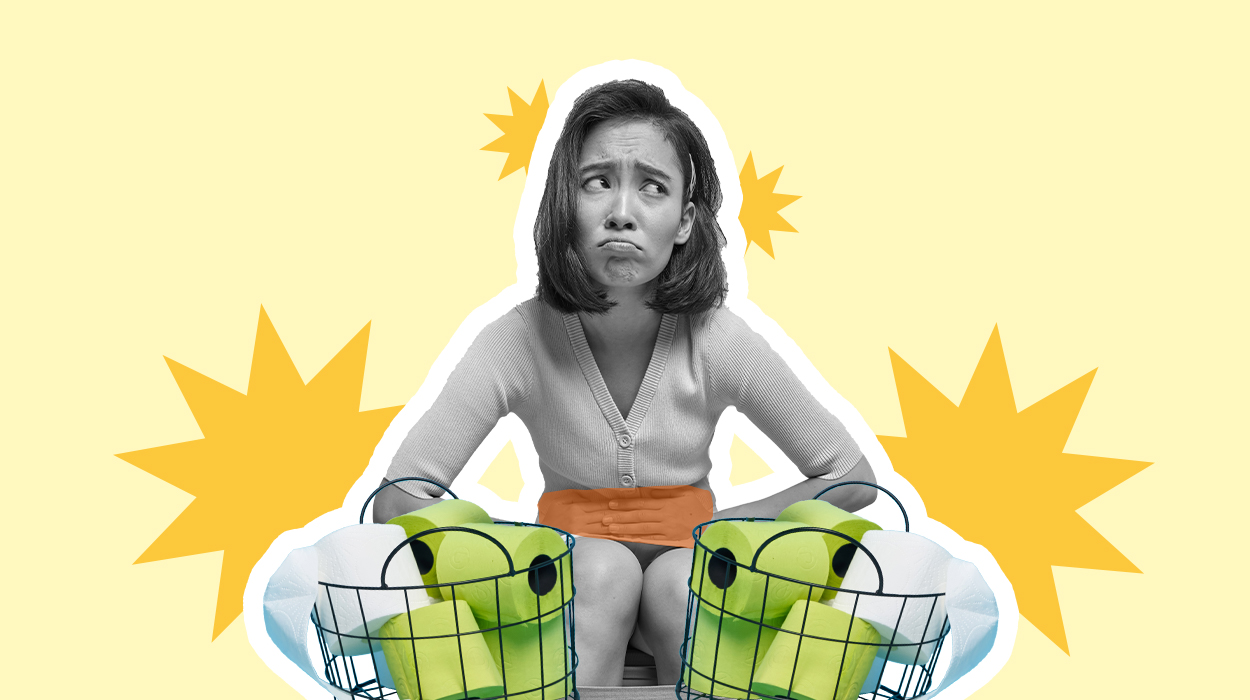There are many upsides to changing your lifestyle, including more energy, weight loss, and sometimes improved medical outcomes. There are also downsides, though, especially at the beginning of the transition to a different way of eating. But can a keto diet cause diarrhea? Ketogenic diet diarrhea can be a distressing symptom, but it doesn’t have to rule your life; there are many simple remedies you can try to resolve it.
Keto Diet Diarrhea
Diarrhea occurs when feces pass through the bowel so quickly that too little water is reabsorbed by the intestine and stool is watery, loose, and frequent. In some people, a keto diet can cause diarrhea because of the change in diet habits including large amounts of fat and an increase in dairy products if you are lactose intolerant.
By transitioning slowly to keto, staying hydrated, and eating soluble fiber you may be able to avoid keto-induced diarrhea. If your diarrhea lasts more than a couple of weeks after starting the diet you should seek a doctor’s help.
Keto Diet Diarrhea: What Is It?

Keto diet diarrhea can have several causes, including low fiber, high dietary fat intake, and lactose sensitivity or intolerance. Remedies include increasing your intake of soluble fiber, choosing probiotic or prebiotic foods, gradually easing into the diet, and drinking more water. In this article you will find more information about each of these topics, plus how long keto diarrhea is likely to last and when you should seek outside help.
Causes Of Diarrhea On Ketogenic Diet
Lack Of Fiber
One of the hallmarks of the ketogenic diet is limited fruit and vegetable intake. Eating fewer fruits and vegetables means fewer carbs in the diet, but it can also translate to reduced fiber. For some, this lack of fiber leads to constipation, a problem on the opposite end of the digestive spectrum. But lack of fiber can actually be the culprit responsible for diarrhea as well.
Many of us think of fiber as the tough substance found in fruits and vegetables that helps to bulk the stool and treat constipation. It is true that this is one kind of fiber, and that it’s a critical part of a healthy diet. It turns out, however, that there is more than one kind of fiber.
There are two kinds of fiber in fruits and vegetables known as insoluble and soluble fiber, which is indigestible by the human gut and passes through the digestive tract largely unchanged. Insoluble fiber treats constipation by adding bulk to the stool, which stimulates the bowel.
The other kind of fiber is soluble fiber, and it can be used to treat both constipation and diarrhea. Soluble fiber attracts water in the gut and forms a gel-like substance that slows the progression[1] of food through the gastrointestinal tract. When food moves more slowly through the bowels, it gives your body more time to resorb excess water and fat, which translates to firmer stools and less diarrhea.
High Fat Diet
If there’s a defining characteristic of the keto diet, it’s increased fat intake. But while these delicious fats may be pleasing to your palate, they can be upsetting to your gut, especially if you were previously restricting fats.
Each of us has a microbiome, a unique community of beneficial and pathogenic bacteria in our GI tract that keep one another in check and help us digest our food, among many other functions. Our microbiome changes according to what we eat, since different nutrients allow different bacteria to thrive.
This means that if you have been accustomed to a certain diet – for example, a diet high or even moderate in carbohydrates – and suddenly introduce extreme dietary changes, your microbiome may be ill-prepared to aid you in digesting that nutrient. In turn, this can lead to intestinal irritation, increased fat and water left in the stool, and finally diarrhea.
Lactose Consumption
One of the ways people increase their fat intake on the keto diet is through the consumption of full-fat dairy products. With more dairy comes more lactose, the predominant sugar found in cow’s milk.
Some people are not able to digest lactose as well as others due to genetic or environmental conditions.[2] If your keto journey involved a sudden increase in dairy intake, lactose may be the culprit of your diarrhea.
How To Get Rid Of Keto Diarrhea Symptoms?
One of the ways to reduce keto diarrhea is by upping your intake of soluble fiber.[3] Traditional food sources of soluble fiber include oats, barley, and bran made from oats or barley, but these choices are high in carbs, which doesn’t always fit the low-carb diet plan of keto.
Psyllium husk,[4] however, can be a great choice and non-starchy veggies are also an option. You can also try other fiber supplements that contain soluble fiber and don’t add too many net carbs to your eating plan.
You can support the change your gut microbiome is undergoing with probiotic and prebiotic foods. Probiotic foods are those that contain live bacteria that are introduced directly to your gut.
Prebiotic foods, on the other hand, provide the kinds of nutrients that gut biota like to consume, thus feeding them and promoting their growth. Pro- and prebiotics can encourage the growth of beneficial bacteria, which in turn help to crowd out pathogenic gut bacteria that may be flourishing in your GI tract.
Transition Slowly
Another way to support your body as it adjusts to your diet is by transitioning more slowly to the keto lifestyle. If you changed to a keto diet overnight, your microbiome may be especially unready to help you digest the kinds of foods you are now eating in abundance.
Try scaling back and increasing your carbohydrate and protein intake temporarily, and then go back to a high-fat diet more gradually this time. And pay attention to the ingredients in the foods you choose, since artificial sweeteners can promote GI distress.[5]
Hydration
Regardless of what causes your diarrhea, it’s important to ensure you remain hydrated when experiencing it.
Occasional loose stools are unlikely to cause serious dehydration, but persistent diarrhea can result in substantial water loss that can make you feel weak and thirsty, and further compromise your distressed system.
Adding some electrolytes to your beverages is a good idea, too, since diarrhea can rob you of essential electrolytes along with water.
How Long Does Keto Diarrhea Last?
Since the keto diet is relatively new to the scene as a diet used by the general public, there is not a lot of evidence on how long you can expect keto diarrhea to last. In general, if your diarrhea is truly the result of keto and not another underlying issue, it should likely resolve within a couple of weeks.
Using the tools and tips mentioned here may shorten the duration of your diarrhea even further, or even alleviate keto diarrhea altogether.
As you are trying different techniques to stop keto diarrhea, keep note of what you try and the effect each intervention has on your stools. This will not only allow you to pinpoint what works best for you but can also serve as a helpful tool if you end up going to see your doctor about your diarrhea.
When Should You Consult A Doctor?

Certain symptoms always merit a consult from a healthcare professional. Be sure to make an appointmbrient[6] with your primary care provider if you experience:
- Rectal bleeding.
- Black, tarry stools.
- Persistent nocturnal cramping or pain.
- Persistent nocturnal diarrhea.
- Worsening abdominal pain.
- Symptoms of severe dehydration, include weakness, disorientation, racing heartbeat, dry mouth, or inability to urinate.
- Diarrhea is accompanied by constitutional symptoms such as fever, chills, muscle aches, and body aches.
- You have a personal or family history of irritable bowel syndrome or colorectal cancer.
- You think you may have lactose intolerance.
Conclusion
Starting any new eating routine can be a challenge in many ways, and unfortunately, diarrhea can be one of the issues you face when switching to keto. Take it slow, try out some of the suggestions mentioned in this article, and be sure to follow up with your doctor if you have any worrisome symptoms.
Frequently Asked Questions
The transition to a keto diet alters the foods that you eat and this alters the microbiome in your gut. Transitioning to a high-fat diet is a drastic change and this upset in the microbiome of the gut can result in diarrhea.
Make the transition gradual to keto so that your gut microbiome can adjust. In addition, you should drink plenty of water, eat soluble fiber, and take probiotics to help balance your gut.
Once your body adjusts to the new diet, within a couple of weeks, the diarrhea should stop. If it continues, or if there is blood in your stool contact a medical professional.
 Expert's opinion
Expert's opinion
